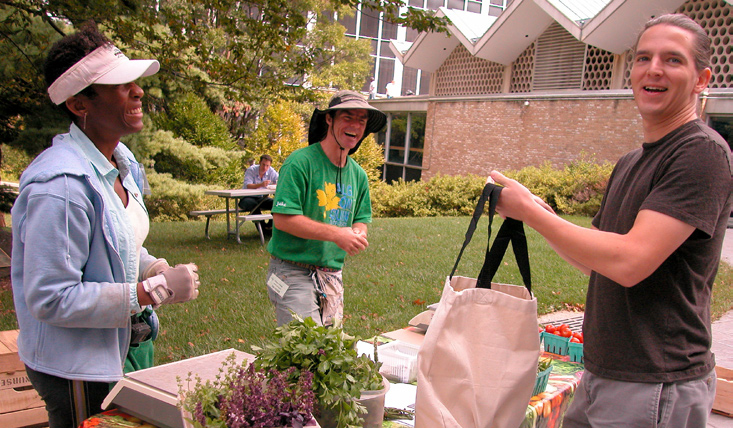Farmers’ Market Returns to NIH
By Belle Waring
Fresh, convenient and affordable. From now until the first hard freeze, each Tuesday from 10:30 a.m. to 1:30 p.m. on the Bldg. 31A patio, it’s a plum assignment.
Local farmers are back.
“Once 9/11 happened, NIH didn’t allow farmers in,” says Charmaine Peters of Licking Creek Bend Farm in Needmore, Pa. “Sept. 9 [of 2008] was our first day returning
and [NIH Recreation & Welfare President] Randy Schools was instrumental in helping get us back.”
So get your tomatoes, green beans, apples, peaches, pears, plums, pumpkins, squash, herbs and tomatillos
(perfect with enchiladas). At 100 miles north of Bethesda, Needmore features temperatures an average 10 degrees lower than here. Depending on the weather, their harvest could last through October.
Licking Creek, currently owned by Michael Tabor, was one of the original participants in the NIH Farmers’ Market.
It’s certified to accept both WIC and food stamps, but it does not provide new plastic bags. In the mood to declutter? Bring in extra bags for co-workers.
Flanking the produce, a beekeeper who goes by the name Wagner offers wildflower honey produced at his home in Suitland, Md.
“I don’t have dogs or cats,” says Wagner. “I have bees. They’re harmless if you don’t mess with them; they’re busy doing their own stuff.” He lives next door to Suitland Park, where his bees sip wildflower nectar before returning to the hive.
“It takes 40,000 trips for a bee to make one drop of honey,” he says. He recalls last year’s drastic colony collapses in North America and Europe, with bee disease and pesticides as possible causes: “Since 80 percent of food is pollinated by bees, I’m against pesticides.”
Schools says he’s already getting great feedback, with healthy eatables now just steps—or a shuttle ride—away.
“NIH was one of the first federal agencies to ever have a farmers’ market,” he says. “It began with the Montgomery County department of agriculture in cooperation with the R&W.”
With enough support, more local growers may join the spring market, to restart in May ’09.
“The nice thing about this,” says Schools, “is that the employees of NIH are able to develop a relationship with the farmers who put food on their table.” |
 |
|
Top:
Bring your own bag: (from l) Charmaine Peters and Ward Morrison (c) close the sale.
Above:
At left, Licking Creek Bend Farmers (from l) Peters, Leah Cohen and Morrison. At right, Peters brings the basil.
Below:
At left, another customer reaches for his wallet.
At right, most honey, says beekeeper Wagner, is produced by independents, or “hobbyists,” like himself.
Photos: Belle Waring |
|
|